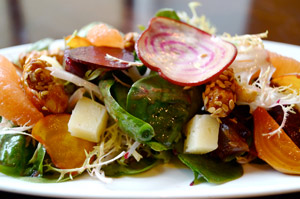A Washington, D.C., nonprofit organization has sought to improve the culinary landscape as it pertains to health, nutrition and sustainability. Modeled after the industry-recognized, highly structured LEED certification process, the Responsible Epicurean and Agricultural Leadership (REAL) program aims to recognize and reward restaurants that take steps toward not only saving natural resources, but also offering healthier food options and supporting local, sustainable producers.
 While the menu at RIS features some fried items, such as shrimp tempura and soft-shell crab, the majority of the fare revolves around seasonal, fresh vegetables, like the beet salad seen here, and includes more grain-based options.Research shows consumers want healthier food options when they dine out. In response to this driver, as well as rising obesity concerns, Lawrence Williams founded the United States Healthful Food Council (USHFC) in 2011. REAL, which began as a pilot program a year later through the USHFC, uses a flexible, points-based system similar to LEED's rating system and measures an operation's consideration of health and environmental impact, and its overall nutrition best practices.
While the menu at RIS features some fried items, such as shrimp tempura and soft-shell crab, the majority of the fare revolves around seasonal, fresh vegetables, like the beet salad seen here, and includes more grain-based options.Research shows consumers want healthier food options when they dine out. In response to this driver, as well as rising obesity concerns, Lawrence Williams founded the United States Healthful Food Council (USHFC) in 2011. REAL, which began as a pilot program a year later through the USHFC, uses a flexible, points-based system similar to LEED's rating system and measures an operation's consideration of health and environmental impact, and its overall nutrition best practices.
This includes assessments of cooking and food preparation methods; use of fresh vegetables, fruits and organics; avoidance of processed foods; composting and recycling efforts; local and sustainable food sourcing; sodium reduction efforts; and green-cleaning purchases, among other markers. The REAL Certification program also takes into account foodservice equipment, such as the number of fryers used, and healthier preparation methods such as steaming versus charring on a charbroiler, for example.
"The impetus behind REAL came from consumers," says Williams. "There seems to be a misalignment of interest in the foodservice industry, which is not always focused on nutrition and sustainability as the top priorities, especially during an economic downturn. There is little reward for operators who are focused on nutrition and healthier options."
Four B&I operations managed by Guckenheimer Group were the first to earn initial REAL certification status earlier this spring. These include Blue Glass Café in Boston; Café Hive in Pleasanton, Calif.; W6 Café at Google's San Francisco office and Union Pacific Café, which is also open to the public, in Omaha, Neb.
REAL is finalizing its guidelines for independent restaurants and adding different certification levels, which will reflect the LEED-style approach of varying levels of baseline certification: silver, gold and platinum. When that happens, the REAL "verified" restaurants — not including the Guckenheimer Group cafés — that have already completed a prescreening will have the option to apply for official certification. Williams says REAL certifiers will work with the restaurant or operation, if necessary, to meet those guidelines to achieve certification.
The ultimate goal of REAL, Williams says, is to "increase the availability and consumption of healthful, sustainable foods, and the best way to do that is to make those foods more profitable for restaurants. If that can be done, there will be a greater incentive for businesses to serve them."
With so many differing definitions as to what constitutes "healthy" food, REAL uses a flexible system that rewards restaurants for hitting targets in certain areas. "Some people are more concerned with sodium and fat, and for others, it's all about portion sizes," Williams says. "The same goes with green building — from water consumption to power consumption, transportation and bike racks, there are many different ways to earn credits and reduce environmental impact."
REAL's certification teams consist of registered dieticians, nutrition- and sustainability-focused chefs, policy and medical experts and other leaders in the field. The process begins with the applying restaurant signing a legal contract whereby it swears by the truth of its claims. REAL certifiers then analyze the restaurant's menu and schedule face-to-face interviews to go over outstanding areas for clarification.
"We will then try to assess whether they have earned enough points based on the information they provided using our minimum threshold," says Williams. "Although the certification program almost exclusively revolves around food and nutrition, we do give credits for green cleaning and energy efficiency." REAL plans to conduct regular audits in the future, especially if a restaurant goes through major changes in concept, chef or menu.
Some of the challenges with establishing a finalized set of certification guidelines, Williams says, have to do with the variability among restaurants. As a result, a broad data set is needed, but not one so broad that any restaurant can earn certification.
Currently, 21 restaurants in Washington, D.C., have earned REAL verification status. However, Williams plans to expand the program across the country. He is currently focused on a short list of six cities for a nationwide rollout in the next six months. REAL has also looked into expanding the program into the fast-casual and quick-serve segments.
"Nutrition and health is what sustainability was five years ago," Williams says, noting that the recession caused a temporary setback in the sustainability movement. "The person who used to be the VP of Sustainability now might hold the title of VP of Health and Wellness."



